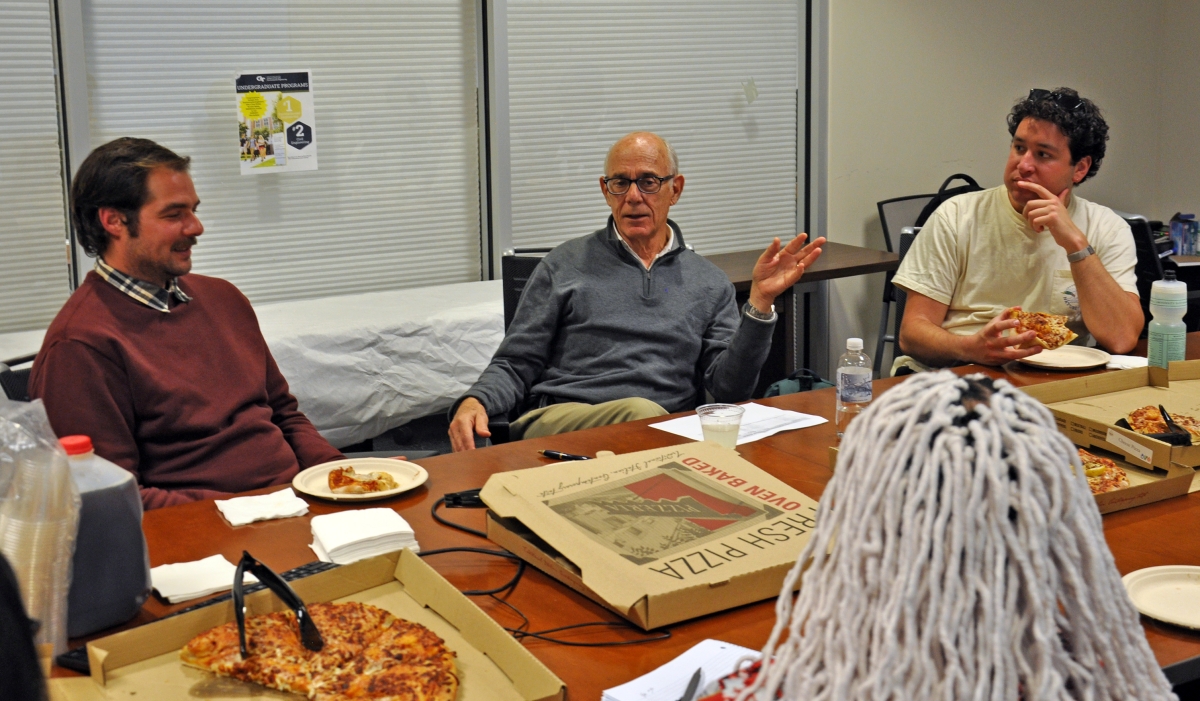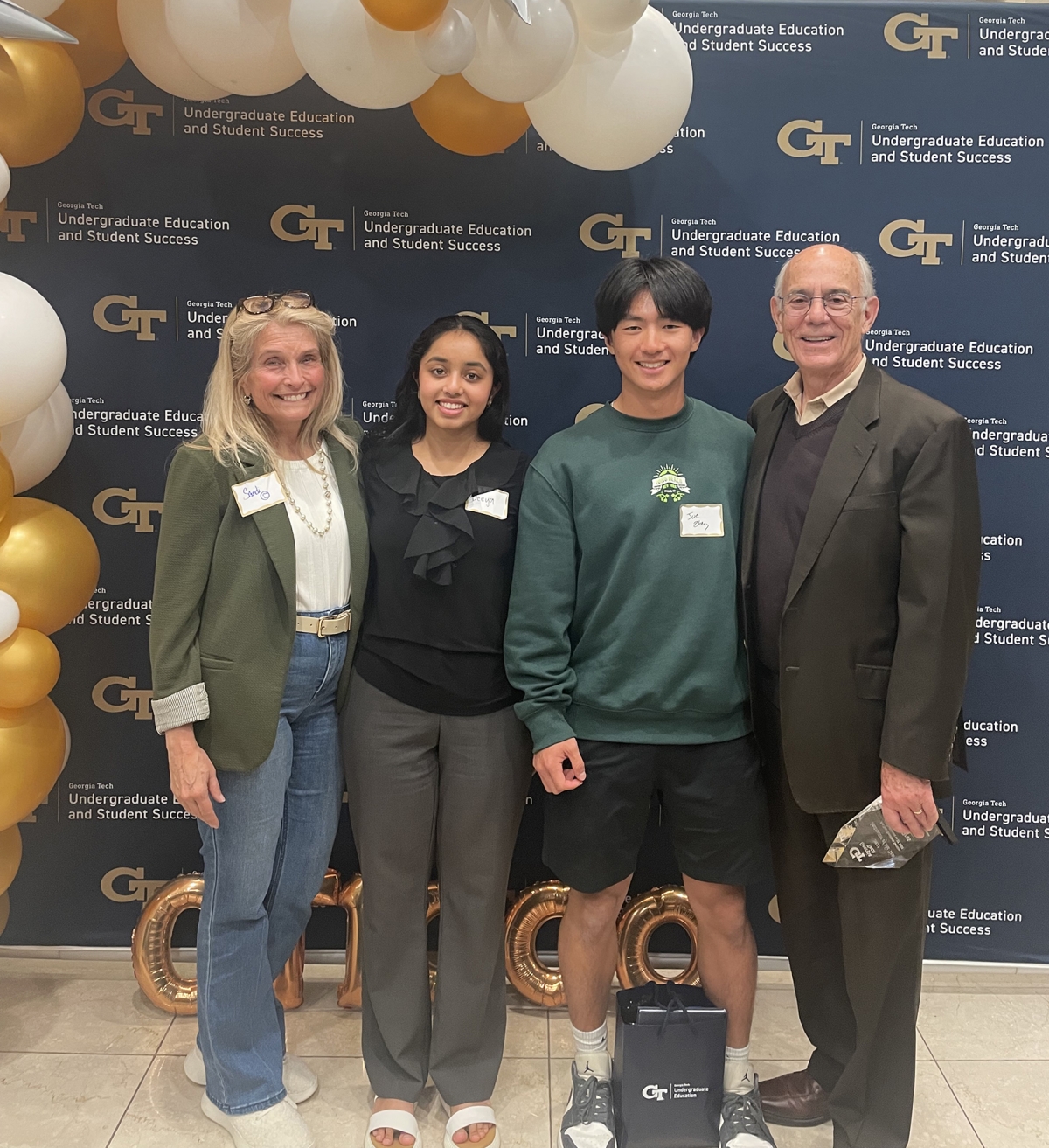
Professor Rafael Bras serves up leadership wisdom along with pizza to members of the Graduate Leadership Academy. (Photo by Michael Hunter)
Professor Rafael Bras is a renowned scholar and leading voice in the field of hydrology. But these days, Bras—who honed his leadership skills as the former provost and executive vice president of academic affairs for Georgia Tech — is most passionate about sharing lessons on leadership to students of all ages.
He works with first-year students as an instructor of GT 1000, created a faculty leadership program, and recently established a program focused on leadership for graduate students.
During a visit to Stanford University, Bras, a Regents’ Professor and the K. Harrison Brown Family Chair in the Schools of Civil and Environmental Engineering and Earth and Atmospheric Sciences, was impressed by its Knight-Hennessy Scholars program. The program provides financial support to students to pursue graduate studies at Stanford while engaging in experiences that prepare them for leadership roles upon graduation.
He recognized a gap in leadership training for graduate students at Georgia Tech — one that he was determined to fill.

Professor Sandi Bramblett, current GT 1000 students Deeya Mepani and Joe Zheng with Rafael Bras at the GT 1000 Teacher of the Year awards Nov. 13
“I felt for a long time that that graduate students do not get the opportunities that undergraduates and, for that matter, staff and faculty get in one particular dimension: leadership development and development as overall individuals beyond their particular specialties,” said Bras. “They tend to focus very much on what they're doing and do nothing else.”
In the fall of 2024, Bras launched the Graduate Leadership Academy (GLAD) for civil and environmental engineering graduate students. The program is a voluntary, year-long experience designed to foster self-awareness, communication skills, and leadership capacity. Students apply and are selected to participate, receiving a modest stipend and, as Bras humorously noted, “free pizza.”
Academic leaders of the future
According to Bras, the program consists of three components. One is listening to established leaders. He invites leaders to share their stories with the students and then encourages questions and discussion.
Bras hopes the students will realize “not all leaders are the same and most likely they will be quite different to any of the people they see.”
His goal is to help the students realize their strengths and weaknesses and build on that knowledge in terms of leadership and self-awareness.
Past speakers include Georgia Tech President Ángel Cabrera, former Tech presidents G.P. “Bud” Peterson and G. Wayne Clough, as well as Georgia Tech school chairs.
The other components come into play when the program doesn’t have a guest speaker. Bras leads the students in an open discussion related to leadership issues, often spurred by current articles in journals, newsletters or newspapers. Another aspect of the program is role-playing scenarios.
“What would you do if this happens, and how would you handle communications?” Bras said.
He believes that “one of the best strengths of a leader is the ability to articulate their vision and their ideas in a story,” so he puts students on the spot to develop their oral communication skills.
Since many of the graduate students will seek careers in academia, Bras spends time explaining how a university works, covering budgeting, university processes and assembling a leadership team.
“They get an appreciation of what are the functionalities, what are the processes that you have to worry about,” Bras said.
While every university is different, there are a lot of similarities. The students “begin to understand those complexities and that a leader, when faced with decisions, very rarely faces a decision where the answer is completely backed up with data and is completely clear,” Bras said.
Bo Rider, a master’s student in the Structural Engineering, Mechanics and Materials group, is a member of the current GLAD cohort. Rider said he appreciates that GLAD is not a standard leadership program, with a focus on current events and “very targeted, topical issues.”
“I signed up for GLAD due to the opportunity to learn about academic leadership from a proven leader in Dr. Bras,” Rider said. “The program has helped me understand what effective academic leadership entails through intimate discussions both within the cohort and with visiting academic leaders.”
Rider, who is interested in a career in academia, said he has especially enjoyed talking to guest speakers like Raheem Beyah, who was recently appointed provost of Georgia Tech.
“He was very inspiring in his interpersonal humility and professional confidence,” Rider said.
A “labor of love” interweaving leadership
Since 2018, Bras has been an instructor for GT 1000, a seminar course that aims to help first-year students at Georgia Tech build a sense of belonging, develop academic and career plans, and connect with the people and resources that will support them throughout their time at Tech.
Bras’ co-teacher in the GT 1000 course is Sandi Bramblett, the retired executive director and associate vice president for institutional research and enterprise data management at Georgia Tech. She said having the Institute’s chief academic officer teach a first-year seminar was highly unusual, but that Bras wanted to do it to better understand the first-year student experience. She was surprised and delighted when he reenlisted every subsequent year.
“He does not have to teach these undergraduates,” Bramblett said about Bras. “He could focus all his time on faculty and graduate students if he wanted to, but he chooses to be here. The fact that he could take an hour a week and commit that to students just spoke volumes about his dedication to teaching these students.”
Bramblett described the class as a “labor of love,” for the two co-teachers. They teach first-year students academic planning, how to work on team presentations, build resumes, and how to foster a sense of community with classmates.
“We try to get them to picture what their future is,” Bramblett said. “And we interweave leadership into almost all of our lessons.”
And his students appreciate his efforts. Several current and former students nominated Bras for “GT 1000 Teacher of the Year,” an honor he accepted on Nov. 13 at a presentation at the Bill Moore Success Center.
Mentoring faculty leaders and beyond
Bras’ leadership efforts also extend to the faculty. He is the program director for the Faculty Executive Leadership Academy (FELA), a program designed to identify, foster, and develop senior academic faculty members for leadership. The two-year program began in 2022 and included in its first cohort was CEE Professor Susan Burns, currently serving as interim Associate Vice President for Research Operations and Infrastructure. A second cohort of four professors was selected in July 2024. Bras serves as a mentor, discussion leader, and guide to the participants, who spend six months shadowing the Institute’s executive officers and work on two year-long, high-impact projects focused on the mission or strategic goals of Georgia Tech.
While the GLAD program serves students in CEE, Bras’ influence has radiated out across the institute. The Stamps Fellows Program is a merit-based doctoral fellowship started in 2025, created to attract exceptional scholars and support their development into leaders.
Bonnie Ferri, Vice Provost for Graduate and Postdoctoral Education said, “I really respect the GLAD program and used it as an inspiration for the Stamps Fellows leadership program that we started this year. Dr. Bras is on the advisory board of the Stamps Program because we were impressed by GLAD and wanted him to help shape the vision for Stamps.”
How does Bras feel about molding leaders from freshman to faculty?
His answer is characteristically forthright: “You know, after all, leadership is leadership, no matter how old you are.”
